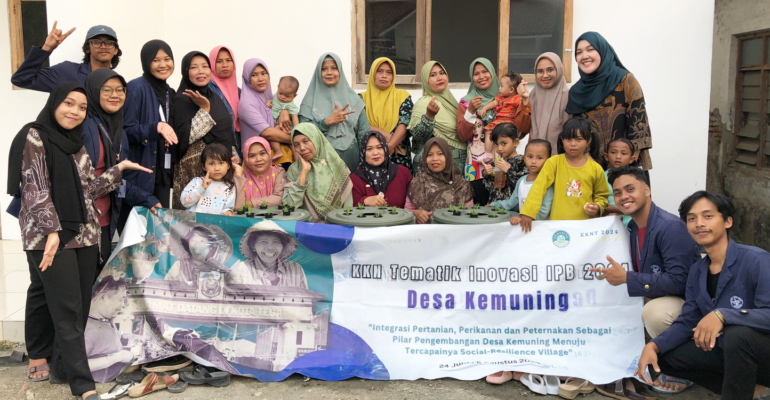IPB University Innovation KKNT Students Introduce Budikdamber to Kemuning Village PKK Mothers

With the increasing narrowing of agricultural land and high stunting rates in the community, it is imperative to adopt alternative methods that can help provide a source of animal protein and fresh vegetables in a home environment with limited space.
This problem of narrowing agricultural land and high stunting rates was analysed by IPB University’s Innovation Real-Thematic Work Lecture (KKNT) students by introducing the method of fish farming in buckets (Budikdamber) to women empowering family welfare (PKK) in Kemuning Village, Kramat District, Tegal, Central Java.
“This method is an innovative solution to improve food security and community nutrition. Budikdamber is a fish farming method that does not require fertiliser, large land area, electricity, lots of water, or oxygen supply in the pond,” explained Adam Zuhdi, IPB University student, member of the KKNT Innovation team.
He explained that the plants that can be grown include spinach, kale, pakcoy, tomatoes, and others. Meanwhile, the fish raised include tilapia, goldfish, and catfish.
The advantages of Budikdamber, he said, lie in minimal capital and maintenance. This method is easy to maintain, quick to do, and results in higher production by using plants to reduce waste, fertiliser needs, and water use.
The socialisation was led by the person in charge of the programme, Tabina Irviana Fakhirah, a student of the Faculty of Fisheries and Marine Science (FPIK) of IPB University. Tabina explained that the cultivation of catfish (Clarias sp.) in buckets can be an alternative for the community there, especially mothers to utilise their home land for additional economic income, because this method does not require a large area.
“This programme is very useful for mothers who want to cultivate at home, because not only can they save money on food, but they can also get kale and catfish at the same time,” she said.
Alfiatun, Chairperson of the Kemuning Village PKK, continued, “It is hoped that with this socialisation, mothers will be interested in this programme and can use it for cultivation in their homes. Some of the women have already tried it, but unfortunately no one has continued. Hopefully, with this programme, they will be more motivated to continue.” (*/Rz) (IAAS/RUM)



